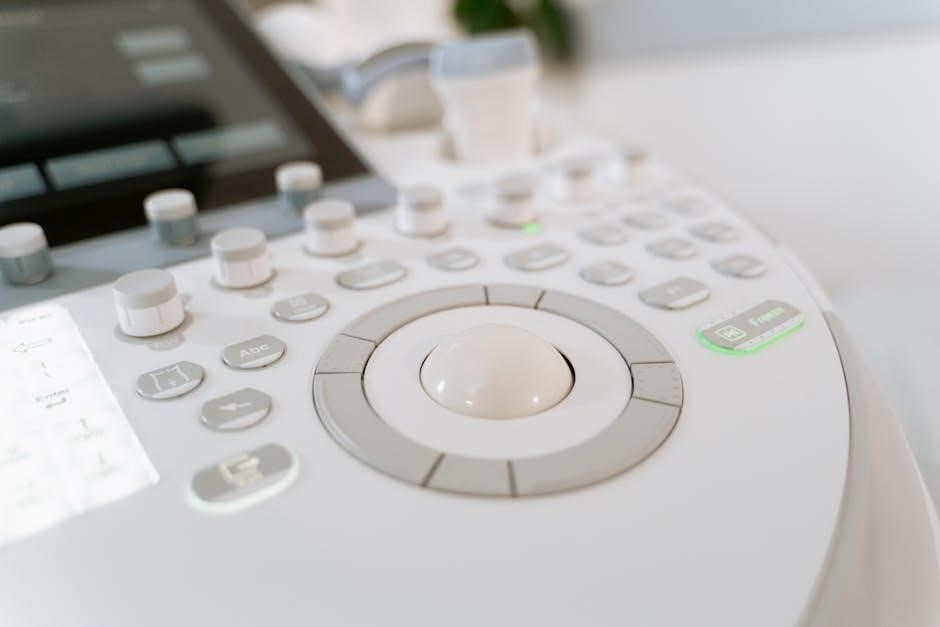pca test answer key pdf
The PCA Test Answer Key PDF is a valuable resource for test preparation, providing correct answers and explanations to help candidates assess their performance effectively.

Overview of the PCA Test
The PCA test is a certification exam designed to assess the knowledge and skills of Personal Care Assistants (PCAs). It ensures that candidates meet the required standards to provide quality care. The test consists of two parts: a written examination and a practical test. The written exam includes 100 multiple-choice questions, requiring a minimum of 80 correct answers to pass. The practical test evaluates hands-on skills through 14 activities, with each item marked as Pass or Fail. PCAs must score at least 70% in each section to be certified. The test format and content vary slightly by jurisdiction, with some states offering their own versions. The PCA test is essential for demonstrating competence in patient care, safety, and ethical practices.
Importance of the PCA Test Answer Key
The PCA Test Answer Key is an essential tool for candidates preparing for the Personal Care Assistant certification exam. It provides correct answers and detailed explanations, enabling test-takers to assess their performance accurately. By identifying incorrect responses, individuals can focus on weak areas and enhance their study strategies. The answer key also serves as a guide for understanding complex questions and improving comprehension of care-related topics. Additionally, it helps in verifying scores and ensuring transparency in the evaluation process. Utilizing the answer key effectively allows candidates to refine their knowledge and skills, ultimately boosting their confidence and readiness for the exam. It is a vital resource for achieving success in the PCA certification.

Understanding the PCA Test Format
The PCA test includes a written exam with 100 questions and a practical test with activity pages, assessing both knowledge and hands-on skills effectively.
Written Examination: Structure and Content
The written examination consists of 100 multiple-choice and true/false questions, requiring a minimum of 80 correct answers to pass. It assesses knowledge on patient care, safety, and ethical practices. Topics include infection control, medical terminology, and patient rights. The test is timed, and candidates must manage their time effectively to complete all questions. The PCA Test Answer Key PDF provides correct answers and explanations, helping candidates identify areas for improvement. Understanding the structure and content is crucial for effective preparation and achieving a passing score. Utilizing study materials and practice tests can enhance familiarity with the exam format and question types.

Practical Test: Activity Page and Requirements
The practical test includes an activity page with 14 items, focusing on hands-on skills like using medical equipment, demonstrating patient care, and following safety protocols. Each task is evaluated as pass or fail, with optional items based on specific needs. Candidates must complete activities accurately and safely, showcasing their ability to apply knowledge in real-world scenarios. The PCA Test Answer Key PDF provides detailed explanations for each task, helping candidates understand expectations and improve their practical skills. Proper preparation and familiarity with the activity page are essential for success, as the test assesses both technical proficiency and adherence to care standards.
PCA Test Answer Key: Role and Significance

The PCA Test Answer Key PDF plays a crucial role in evaluating performance, identifying areas for improvement, and ensuring accurate self-assessment, enhancing overall test preparation and understanding.
How to Use the PCA Test Answer Key Effectively
To use the PCA Test Answer Key PDF effectively, start by reviewing your test results to identify incorrect answers. Compare your responses with the key to understand where errors occurred. Focus on analyzing the rationale behind correct answers to improve comprehension. Use the key to pinpoint weak areas and tailor your study plan accordingly. Regularly practicing with sample questions and referencing the answer key can enhance familiarity with the test format. Additionally, track your progress over time to monitor improvement. This systematic approach ensures efficient learning and better retention of key concepts, ultimately boosting confidence and performance in the actual PCA test.
Common Mistakes to Avoid When Using Answer Keys
When using the PCA Test Answer Key PDF, avoid relying solely on the correct answers without understanding the reasoning. Neglecting to review incorrect responses can hinder learning. Many candidates overlook analyzing their mistakes, missing opportunities to improve. Others rush through the key without cross-referencing with study materials, leading to gaps in knowledge. Additionally, some test-takers skip reviewing the rationale behind answers, which is crucial for comprehension. Avoid treating the answer key as a mere checklist; instead, use it to identify patterns in errors and strengthen weak areas. Proper utilization ensures a deeper understanding and better preparation for the actual test.
Preparing for the PCA Test
Effective preparation involves utilizing resources like practice tests and study guides to understand the test format and content, ensuring a comprehensive understanding of key topics and skills.

Study Materials and Resources
Utilizing high-quality study materials is essential for success on the PCA test. The PCA Test Answer Key PDF, along with practice tests and guides, provides detailed explanations and verified answers to help candidates understand their strengths and weaknesses. Online resources, such as flashcards and study guides, offer comprehensive coverage of test topics, including patient care procedures, medical terminology, and ethical practices. Many platforms, like Quizlet, allow interactive learning to reinforce key concepts. Additionally, official study manuals and training programs are available, offering structured learning paths tailored to the PCA exam format. Consistent use of these resources ensures a well-rounded preparation and improves test-taking confidence and accuracy. Regular practice with up-to-date materials is crucial for achieving a passing score.
Practice Tests and Their Benefits
Practice tests are an invaluable tool for preparing for the PCA exam, offering a realistic simulation of the actual test environment. They help candidates familiarize themselves with the test format, including multiple-choice and true/false questions, while improving time management and pacing. Regularly taking practice tests allows individuals to identify and address weak areas, ensuring a more focused study approach. Many practice tests include answer keys, providing immediate feedback and explanations for correct and incorrect answers. This feature enhances learning by clarifying concepts and reducing confusion. Additionally, practice tests build confidence and reduce anxiety, enabling candidates to perform at their best on test day. Incorporating practice tests into a study routine is a proven strategy for achieving success on the PCA exam.
PCA Test Content and Question Types
The PCA test includes written and practical sections, with multiple-choice and true/false questions. The written exam covers patient care concepts, while the practical test assesses hands-on skills like transfers and catheter use.
Multiple-Choice Questions: Strategies for Success
To excel in PCA test multiple-choice questions, focus on carefully reading each question and identifying key terms. Eliminate obvious distractors first to narrow down options. Use process of elimination to increase accuracy when unsure. Review the PCA test answer key to understand common question patterns and recurring topics. Practice under timed conditions to improve pacing. Pay attention to specific care scenarios, such as catheter management or infection control, as these are frequently tested. Utilize flashcards and study guides to reinforce knowledge of key concepts. Lastly, ensure a thorough understanding of patient care principles, as they form the foundation of most multiple-choice questions.
True or False Questions: Tips for Accuracy
For true or false questions, read each statement carefully to avoid misinterpretation. Focus on key terms like “always” or “never,” which often indicate false statements. Eliminate obviously incorrect answers first to increase confidence. Use the PCA test answer key to review and understand common patterns in true or false questions. Practice identifying subtle differences in wording that can change the meaning of a statement. Review study materials to reinforce knowledge of core patient care concepts. Time management is crucial, so allocate equal time to each question. Avoid guessing unless necessary, as it can lower overall accuracy. Utilize practice tests to refine your ability to discern true from false statements effectively.

PCA Test Answer Key: Verification and Accuracy
The PCA Test Answer Key ensures accuracy by providing verified correct answers, allowing candidates to review and understand their mistakes effectively. Proper verification processes guarantee reliability.
How to Verify Answers Using the Key
To verify answers using the PCA Test Answer Key, candidates should cross-reference their responses with the provided correct answers. For multiple-choice questions, match the selected option with the key. For true or false questions, check each answer carefully. Review explanations for incorrect answers to understand mistakes. Focus on identifying patterns of errors to improve weak areas. Use the key to track progress and ensure understanding of scoring criteria. Practical test answers should be verified by re-examining the activity page requirements. This systematic approach ensures accuracy and effectiveness in test preparation. Regular use of the answer key enhances familiarity with the test format and improves overall performance. Consistent verification helps build confidence for the actual exam.
Understanding Scoring Criteria
Understanding the scoring criteria is essential for interpreting results from the PCA Test Answer Key. The written examination requires a minimum of 80 correct answers out of 100 to pass, while the practical test evaluates competency in specific tasks. Each section must be passed with a score of 70, and training can be adjusted to meet individual needs. The answer key provides clear scoring guidelines, ensuring transparency in evaluation. By reviewing the scoring criteria, candidates can better understand their performance and identify areas for improvement. This knowledge also helps in effectively utilizing the answer key for targeted study and preparation. Familiarity with the scoring system allows test-takers to focus on achieving the required standards for certification.
PCA Test Administration and Rules
The PCA Test is divided into written and practical sections, each with specific requirements. The written exam includes 100 questions, requiring a minimum of 80 correct answers to pass. The practical test evaluates competency through hands-on tasks, with each item marked as Pass or Fail. Test-takers must adhere to the provided guidelines, ensuring the integrity of the evaluation process. The test environment and timing are strictly monitored to maintain consistency and fairness for all participants. Understanding these rules is crucial for successful test administration and ensures a smooth experience for candidates.
Test-Taking Environment and Requirements
The PCA Test is conducted in a controlled environment to ensure fairness and consistency. The written examination is completed online, consisting of 100 multiple-choice questions, with a passing score of 80%. The practical test includes 14 tasks, each marked as Pass or Fail, focusing on essential caregiving skills. Test-takers must adhere to specific rules, such as completing tasks within allotted time frames and using only permitted materials. A quiet, interruption-free space is recommended for the written test, while the practical test requires a suitable area for demonstrating skills. Proctors monitor the process to ensure adherence to guidelines, and any violations may result in penalties. Understanding and following these requirements is crucial for a smooth testing experience.
Time Management and Pacing
Effective time management is crucial for success in the PCA Test. For the written examination, consisting of 100 multiple-choice questions, it is essential to allocate time evenly, spending no more than one minute per question to avoid running out of time. During the practical test, tasks must be completed within specified time frames, emphasizing the need to maintain a steady pace. Candidates should practice pacing themselves during study sessions to build stamina and reduce anxiety. Balancing speed with accuracy is key, as rushing may lead to errors, while procrastination can result in unfinished sections. Proper time management ensures that all questions and tasks are addressed, maximizing the chances of achieving a passing score.

PCA Certification: Benefits and Requirements
PCA certification enhances job prospects and demonstrates competency in patient care. Requirements include passing both written and practical tests with a minimum score of 70. Benefits include increased confidence and better patient outcomes.
Why Certification Matters
PCA certification is a cornerstone for personal care assistants, validating their skills and knowledge to provide high-quality patient care. It ensures that PCAs meet standardized competencies, fostering trust and confidence among employers and patients. Certification demonstrates a commitment to professionalism and accountability, essential in healthcare roles. By passing the PCA test, candidates prove their ability to handle critical tasks safely and effectively. This credential often enhances job prospects and career advancement opportunities. Additionally, certification requirements, such as passing both written and practical exams, ensure that PCAs are well-prepared to meet patient needs. The PCA test answer key PDF plays a vital role in this process, aiding candidates in understanding their strengths and areas for improvement, ultimately contributing to better patient outcomes and professional growth.
Passing Scores and Certification Process
To obtain PCA certification, candidates must achieve a passing score of 70 on each section of the test. The certification process includes both a written examination and a practical test, ensuring comprehensive assessment of skills and knowledge. The written exam consists of 100 questions, requiring 80 correct answers to pass, while the practical test evaluates hands-on abilities through specific tasks. Utilizing the PCA test answer key PDF allows candidates to verify their responses and understand their performance. Scoring criteria are clearly defined to maintain consistency and fairness. Upon passing both sections, candidates receive certification, recognizing their competency in providing personal care services. The process may be repeated if initial scores are insufficient, ensuring all PCAs meet the required standards.

PCA Test Answer Key: Frequently Asked Questions
Common questions include how to access the answer key, its accuracy, and how it aligns with test content. Answers are verified for reliability and updated regularly.

Common Queries About the Answer Key
Many candidates inquire about the accuracy and reliability of the PCA Test Answer Key, as well as how it aligns with the actual test questions. Others ask about its availability and how to access it. Some users also seek clarification on how to interpret the answers, especially for multiple-choice and true/false questions. Additionally, there are concerns about whether the key covers all sections of the test, including both written and practical components. Test-takers often wonder if the answer key is updated regularly to reflect changes in the test format or content. These questions highlight the importance of the answer key in helping candidates verify their responses and improve their preparation strategies effectively.
Addressing Test-Taker Concerns
Test-takers often express concerns about understanding and interpreting the PCA Test Answer Key. Common worries include discrepancies between their answers and the key, as well as ambiguity in certain questions. To address these, candidates are advised to thoroughly review the answer key alongside the test questions. If discrepancies arise, cross-referencing with study materials can provide clarity. Additionally, utilizing the key as a learning tool to identify weak areas is highly recommended. For those anxious about performance, focusing on consistent preparation and understanding the scoring criteria can alleviate stress. By leveraging the answer key effectively, test-takers can enhance their confidence and improve future test-taking strategies.
The PCA Test Answer Key PDF is a crucial tool for effective test preparation, offering insights and guidance to help candidates achieve their best results.
Final Tips for Success
Utilize the PCA Test Answer Key PDF to identify weaknesses and strengthen your understanding of key concepts. Regularly practice with past papers and focus on time management during mock tests. Review explanations for incorrect answers to avoid repeating mistakes. Stay calm and systematic during the actual test, ensuring you attempt all questions. Leverage study materials and resources recommended by certified professionals to enhance your preparation. Understanding scoring criteria and common pitfalls will further boost your confidence. By combining diligent study with strategic use of the answer key, you can achieve optimal results and excel in your PCA certification journey.
Next Steps After the Test
After completing the PCA test, review your results to understand your performance. If you passed, proceed with the certification process and receive your credentials. Use the PCA Test Answer Key PDF to verify answers and address any gaps in knowledge. Consider seeking feedback from supervisors or trainers to improve further. If required, schedule a retest and focus on weaker areas identified through the answer key. Once certified, explore job opportunities and continue professional development to maintain competency. Keep your certification updated and stay informed about industry standards. Utilize resources like the answer key for ongoing learning and to refresh your skills periodically.

